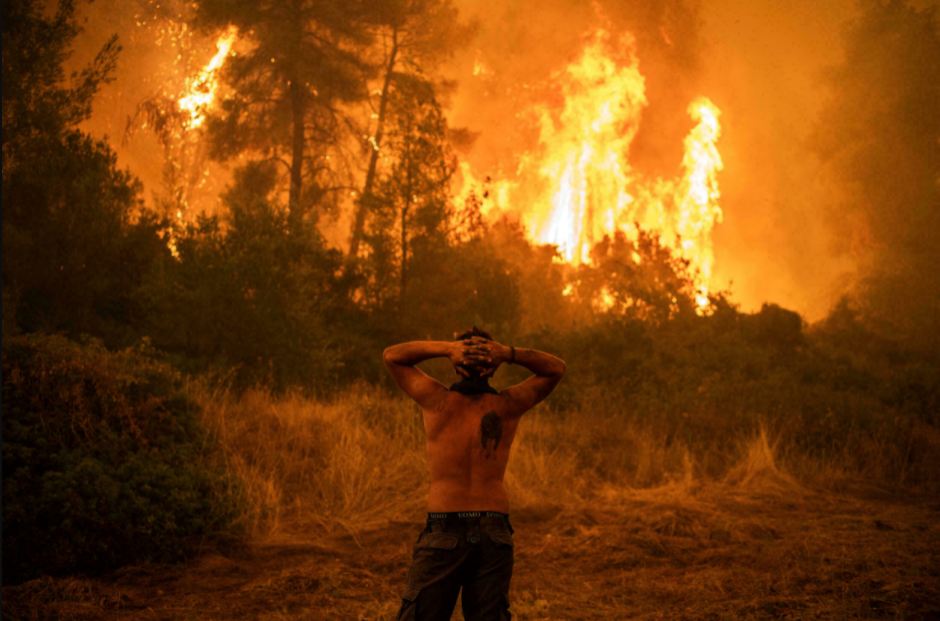International
Wildfires, heatwaves may be the ‘new normal’ as UN releases damning climate report -(Video).
Published
3 years agoon
By
Joe Pee
Amid a summer of record heatwaves, raging wildfires and flooding, the reality of a changing climate has seldom felt more imminent. Scientists hope the release of a landmark UN climate report on Monday will serve as a “wake-up call”, with the findings warning of hotter temperatures, more frequent and severe weather, and – in some cases – irreversible climate damage.
One of the many findings of the report by the UN’s Intergovernmental Panel on Climate Change (IPCC) confirmed that the past six years were the hottest on record. Moreover, that major climate changes, such as rising sea levels, are inevitable and irreversible. The release of part one of the IPCC’s largest-ever report on the state of the world’s climate comes amid months of deadly wildfires, record-high temperatures and floods, with southern Europe, Turkey, the US, Canada and China all hard hit by extreme weather. The other two parts of the report are due out next year.
Wildfires continue to blaze uncontrolled in Greece and in northern California. Fires in Greece have threatened ancient sites, annihilated forests, razed homes and even forced the closure of sites like the Acropolis at the peak of the country’s tourist season. In the densely populated capital of Athens, the heat – combined with smoke-laden skies and raining ash – have kept people indoors for days.
The fires emerged from the worst heatwave Greece has experienced in more than 30 years. One fire official told a local newspaper that the heat was so intense that water from the firemen’s hoses and aircraft was evaporating before it even reached the flames, AFP reported.
Prime Minister Kyriakos Mitsotakis said the fires in Greece are unmistakably linked “to the reality of climate change”.
Rains brought respite in neighbouring Turkey over the weekend in what President Recip Tayyip Erdogan described as the “worst wildfires” in the country’s history.
The barrelling fires have scorched thousands and thousands of hectares of farmland and pristine forests in several countries this summer alone.
Wildfire weather is expected to become more frequent and strike more regions – even where extreme heat and fires have been less common – according to the IPCC report. And it will only get worse as the planet warms.
Dr Sharon George, a lecturer on environment and sustainability at the University of Keele, told FRANCE 24 that scientists have been warning for years that “the frequency of fires, droughts, floods and severity of storms will get worse”. But until recently, she said, people had “struggled to make the connection between this invisible gas, this CO2” and events like wildfires and floods happening around the world.
“They’re happening in places we don’t expect,” she said referring to Europe’s extreme weather. “And it’s making people start to notice the frequency of these events and say, ‘This is what climate change looks like’.”
The weather events of the summer of 2021 show that “the impacts of climate change are no longer subtle”, Michael Mann, professor of atmospheric science at Pennsylvania State University, told the Guardian. “We see them playing out in real time in the form of these unprecedented extreme weather disasters.”
A new normal?
Wildfires tore through towns in Italy and Spain in July while across the Atlantic extensive heatwaves swept through parts of Canada and the US caused by a rare weather phenomenon, known as a heat dome. The dome was responsible for extremely hot temperatures that sparked forest fires and placed millions of people under a heat alert. Officials recorded hundreds of “sudden and unexpected deaths” due to heat stress.
In California, firefighters were still grappling on Monday with the second-largest wildfire in the US state’s history. Dubbed the Dixie blaze it is the largest active wildfire in the US and only one of 11 major wildfires in California.
“The observations this summer show that some impacts [predicted in prior IPCC reports] seem to be underestimated, but we can’t know if the devastation of summer 2021 is the new normal without a few more years’ data,” said Simon Lewis, professor of global change science at University College London, in an interview with the Guardian.
The global shift toward a “new normal” of more fires of increased ferocity may already have begun in late 2019 and the beginning of 2020, when towering blazes laid waste to bushland, forests and wildlife in Australia and Brazil.
Around 3 billion animals are thought to have been killed or wounded during the fires in Australia.
The widespread devastation caused by these fires turned many seasoned Australian firefighters and farmers, who were once skeptical of the science behind climate change, into advocates for climate action.
Brazil had more than 222,000 wildfires last year, the highest number since 2010, according to the Brazilian space agency INPE, with swaths of the Amazon rainforest affected.
Taming infernos, extreme heat
Preventing and keeping rampaging wildfires in check will require countries to meet the threshold set under the 2015 Paris Agreement to limit the rise in temperature to 1.5 or 2° Celsius above the pre-industrial average. But such a target requires a drastic 50 percent cut in greenhouse gas emissions and many scientists believe that the planet, at its current rate of emissions, is hurtling off course.
“We are on the opposite path from the Paris Agreement. We are heading towards a 3°C increase,” said Patricia Espinosa, executive secretary of the UN Framework Convention on Climate Change, at its opening ceremony on July 26.
Europe’s north would struggle with floods and fires, even with warming at the lowest end of projected targets. In the south, urban heatwaves, drought and agricultural decline are all forecast.
Warming across the Mediterranean region is expected to be about 20 percent higher than global averages in the decades to come as the region is hit with devastating heatwaves, water shortages and a loss of biodiversity as well as risks to food production.
The EU said in a report last year that extreme heat could kill 95,000 Europeans every year, which is more than 30 times the current average.
Some leading experts on Monday were calling for better scientific modelling to more accurately and reliably predict extreme weather events to help populations and governments be better prepared.
The urgency of the situation underscored in the IPCC report has scientists worried.
“We now need to live with the consequences of what we have already done to the climate. We are hopelessly unprepared to deal with increasingly severe extreme weather events, even though these have been predicted by science for decades,” warned Richard Betts, professor of climate impacts at Exeter University, in an interview with the Guardian.
But many hope that witnessing the disasters this summer will raise awareness among populations and politicians alike, leading to bolder decisions to counter the soaring temperatures. The test will come in November, when leaders from 196 countries meet in Glasgow for the UN Climate Change Conference (COP26) with the goal of agreeing on further action to counter climate change.
You may like
-


Mahama Vows to Usher in Era of Fiscal Discipline and National Renewal
-


Elon Musk changes his name to Kekius Maximus on X
-


Mahama Calls for Unity Among Political Parties to Drive Ghana’s Renaissance
-


President-elect Mahama Rallies NDC Supporters: “Pray Harder for Ghana’s Transformation”
-


Ghana’s Economy on the Rise: President Akufo-Addo Highlights Robust Growth in 2024
-


EC Declares Final Verdict in Dome Kwabenya: Faustina Akurugu Elikplim Clinches Victory Amid Controversy
-


Thousands displaced as post-election unrest grips Mozambique
-


Former Black Stars Player Samuel Inkoom Faces Court Over Alleged Visa Fraud
-


Stonebwoy and Samini Mend Ties with Emotional Reunion at 3FM All White Party
















